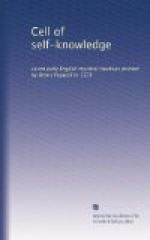Benjamin, for Richard, is the type of contemplation, in accordance with the Vulgate version of Psalm lxvii.: Ibi Benjamin adolescentulus in mentis excessu: “There is Benjamin, a youth, in ecstasy of mind”—where the English Bible reads: “Little Benjamin their ruler."[4] At the birth of Benjamin, his mother Rachel dies: “For, when the mind of man is rapt above itself, it surpasseth all the limits of human reasoning. Elevated above itself and rapt in ecstasy, it beholdeth things in the divine light at which all human reason succumbs. What, then, is the death of Rachel, save the failing of reason?"[5]
The treatise here printed under the title Benjamin is based upon a smaller work of Richard’s, a kind of introduction to the Benjamin Major, entitled: Benjamin Minor; or: De Praeparatione animi ad Contemplationem. It is a paraphrase of certain portions of this work, with a few additions, and large omissions. Among the portions omitted are the two passages that, almost alone among Richard’s writings, are known to the general reader—or, at least, to people who do not claim to be specialists in mediaeval theology. In the one, he speaks of knowledge of self as the Holy Hill, the Mountain of the Lord:—
“If the mind would fain ascend to the height of science, let its first and principal study be to know itself. Full knowledge of the rational spirit is a great and high mountain. This mountain transcends all the peaks of all mundane sciences, and looks down upon all the philosophy and all the science of the world from on high. Could Aristotle, could Plato, could the great band of philosophers ever attain to it?"[6]
In the other, still adhering to his image of the mountain of self-knowledge, he makes his famous appeal to the Bible, as the supreme test of truth, the only sure guard that the mystic has against being deluded in his lofty speculations:—
“Even if you think that you have been taken up into that high mountain apart, even if you think that you see Christ transfigured, do not be too ready to believe anything you see in Him or hear from Him, unless Moses and Elias run to meet Him. I hold all truth in suspicion which the authority of the Scriptures does not confirm, nor do I receive Christ in His clarification unless Moses and Elias are talking with Him."[7]




